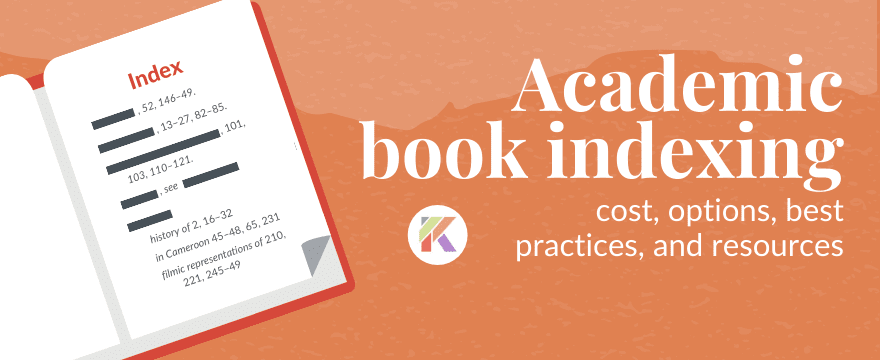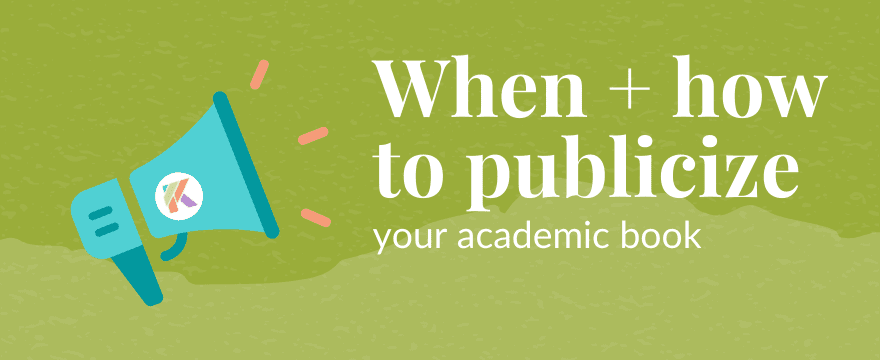You’ve probably used book indexes before, but never thought about how they’re created. Guess what? Preparing an academic book’s index is the author’s responsibility. Whether you choose to do it yourself (I did), or hire someone to do it for you (at your expense), this post outlines the basics on academic book indexes and assembles the top resources that will help you compile a strong book index.
What are the options for preparing my academic book’s index?
When it comes to preparing the index for your academic book, you have two basic options: do it yourself, or hire someone to prepare it for you.
Typically, if you choose to hire someone to prepare your book’s index, you (and not the press) will pay for this service. Sometimes the press will provide you with a list of indexers they recommend.
For more on your options for working with a professional indexer (including associations), see section 2: “Working with a professional indexer” of Tanya Izzard’s “Indexing: A guide for academic authors.”
How much might it cost to have an index prepared for my book?
How much it will cost depends on the indexer’s rate, the manuscript length, the timeline for index’s preparation, and other factors. Indexers usually charge by the typeset manuscript page.
According to the US-based group Ideas on Fire (which offers professional indexing services), it can cost around $1,500 to have an index professionally prepared in a 3–4 week time frame. A longer book or a shorter timeline can cost more.
The estimates Tanya Izzard provides tell a similar story. Expect a professional index for a 100,000-word monograph to cost around $1,121 (given the GBP to USD conversion rate at the time of this writing).
How long will I have to prepare the book index?
Index preparation comes at the very final stage of book production–your book has already been typeset and is very close to being published. So, the turnaround time is quite short. I had two weeks to prepare the index (based on the final proofs).
Wiley tells authors to expect three weeks. Because the book is close to being printed, delays in preparing the index will likely result in delays in the book’s publication.
According to Wiley, you should expect it to take 10–15 hours per 100 typeset pages to prepare a thorough index–or, 30–45 hours total. So, most presses recommend that you begin compiling the index (or, at the very least, the terms and sub-terms that will make up the index) before receiving the manuscript’s proofs. Then, you will add the final (typeset manuscript) page numbers after you approve the final proofs.
How long should the index be?
Here, defer to your publisher first.
At the University of Michigan Press, indexes usually run 8 proof pages, or 24 double-spaced, single-column pages in Microsoft Word. They do note, however, that editors might ask for a shorter index–around 5 pages, or 15 double-spaced, single-column pages in Microsoft Word.
At Wiley, “the ideal page length should be in the range 4–6% of total typeset book pages. For example, a 300-page book would have a finished typeset index of 12–18 pages each containing approximately 100 entries and subentries.”
Best Resources with Step-by-Step Instructions for Preparing Your Index Yourself
Whether you want to learn more about your options or you’ve already decided to prepare your own index, consult these enormously helpful and detailed guides.
Tanya Izzard’s Indexing: A guide for academic authors
Written by accredited, experienced freelance professional indexer Tanya Izzard, this comprehensive post details the types of indexes you might be asked to prepare, outlines what you can expect when working with a professional indexer, offers tips and additional resources for authors who choose to prepare their own index, and gives advice for reviewing the index.
Nancy Mulvany’s Indexing Books, 2nd. ed
The go-to reference for professional indexers, this book covers it all: from the basics like what to index (and what not to) and how to structure your entries to all of the finer points like alphabetizing rules, dealing with obscure names, and formatting the index.
The University of Michigan Press’s Guidelines for Indexing
A comprehensive guide that helps you decide whether topics deserve to be entries, before then covering the numerous (and potentially head-exploding) rules for formatting, punctuating, and capitalizing the index.
Oxford University Press’s “The Index” (part of its Instructions for Authors)
Like the other guides, OUP’s page on the index helps you decide what topics deserve to be indexed and what to omit. Additionally, it is the most helpful in helping you decide what deserves to be converted into sub-entries.
Wiley’s How to Index Your Work
The most comprehensive of the three guides in this section, the strength of this page is its “helpful hints” and “what not to index.” It, like the other guides, also contains lengthy sections on formatting considerations, like constructing entries and sub-entries, cross-referencing, etc.



